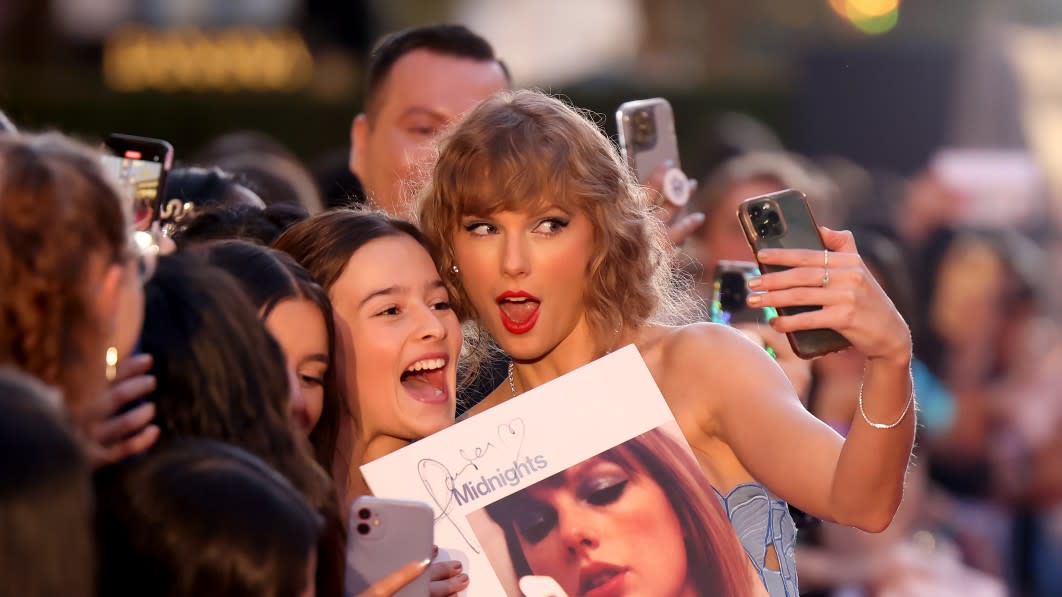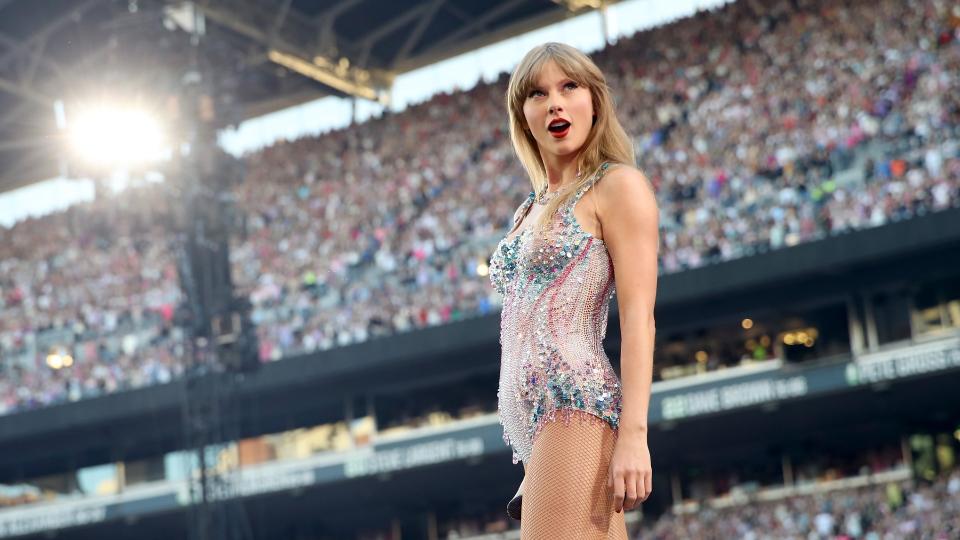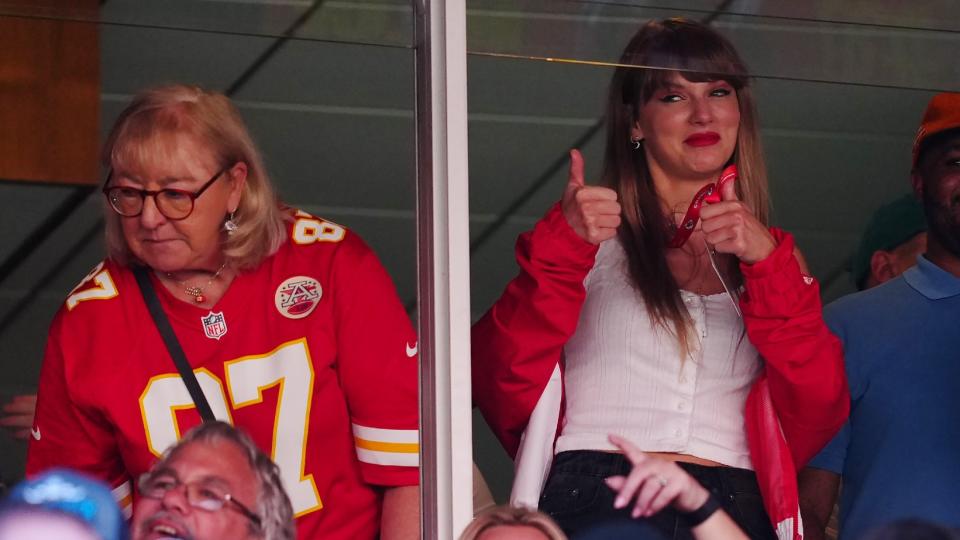The Taylor Swift phenomenon

- Oops!Something went wrong.Please try again later.
Taylor Swift is always in the news: so much so that USA Today recently advertised for a dedicated Taylor Swift reporter. But the big story at the moment is her Eras tour, a 149-date global extravaganza that will go on until the end of next year.
It has generated more than $780 million in sales so far, making it the second-highest grossing tour of all time, behind only Elton John's Farewell Yellow Brick Road. She sold more than two million tickets in one day, causing Ticketmaster to crash. Dancing fans at one concert, in Seattle in July, created seismic activity equivalent to a 2.3 magnitude earthquake.
Bloomberg estimates that her 53 stadium-filling concerts in the US this year have added about $4.6 billion to the wider economy, in travel, hospitality and other costs – an impact so big that it has been given a nickname: "Swiftonomics". She herself reportedly became a billionaire in October. "If Swift were an economy," the president of an online research company recently commented, "she'd be bigger than 50 countries."
She's having a good year, then?
Indeed. In July, she became the first woman ever to have four albums in the US top ten at once, and notched up more No. 1 albums than any other woman in history (12, breaking Barbra Streisand's record). A few months before, she had become the first-ever artist to occupy all ten of the top ten spots on the US Billboard Hot 100 singles chart.
Her songs have been streamed more than 36 billion times. Swift, 33, is easily the world's biggest pop star – a phenomenon on the scale of Beatlemania, or Michael Jackson in the early 1980s. In the US, a staggering 53% of adults consider themselves to be Swift fans, and 16% identify as "Swifties". But her success is not new: she had the US's bestselling albums in 2009, 2014, 2017, 2019, 2020 and 2022.
Who are the Swifties?
Since the beginning of her career, Swift has treated her fans exceptionally well. She does extensive "meet and greets" after every show: her staff pick out the particularly dedicated-looking concertgoers, who are brought to meet her. Fans are invited to her house to listen to her new albums with her. She donates money to some who are in need.
Swift has been rewarded with what is arguably the world's most loyal and numerous fan base. Several million will attend her Eras tour; in Buenos Aires, more than 200 fans have been camping outside the stadium for five months to get the best spots. She has over 500 million followers on social media. It has been estimated, not very scientifically, that there are 100 million dedicated Swifties globally.
"Swift's fanbase skews female, millennial, and white," reports The New Yorker, "though there's plenty of diversity within." The Gaylors, for instance, are convinced that her lyrics are secretly lesbian. The Swifties are famously nice to each other, but they turn viciously on her enemies: those who criticise her have received death threats. "Swift Inc," said Bloomberg, "is essentially a multinational conglomerate with the world's most devoted customer base, its most charismatic CEO and significant economic power."

Where did she come from?
She's been in the business a long time. By the age of ten, Swift had decided to become a songwriter. At 13, she was offered a development deal by RCA, part of Sony Music, and a year later, she persuaded her parents (a Merrill Lynch stockbroker and a marketing executive) to move from suburban Pennsylvania to Nashville to help her pursue her music. In 2005, she signed to Big Machine Records after catching the attention of its chief, Scott Borchetta, at Nashville's Bluebird Cafe; and when she was still only 16, she released her self-titled debut album, a country record. Since then, she has released ten albums, and picked up countless awards, including 12 Grammys from 46 nominations.
Why is she so successful?
Swift unites a rare range of qualities: work ethic, marketing savvy, business instincts, uncommon determination. But most obviously, she's an excellent songwriter. Swift mostly writes with other leading songwriters and hit-makers, but there's no doubting her own talent.
"Swift is a songwriting savant with an intuitive gift for verse-chorus-bridge architecture," noted Rolling Stone. Harmonically, she's fairly unsophisticated: her gift is for melody – particularly catchy hooks – and words.
"She has a terrific ear in terms of how words fit together," says Stephanie Burt, professor of English at Harvard, "and a way of telling stories and creating characters." Her songs are immediately relatable: she started off writing songs about boys and high school. But they have gained glamour by reflecting her complex and high-profile personal life.
How do her songs reflect her life?
Swift has been involved with a series of well-known musicians and actors: Harry Styles, Tom Hiddleston, Calvin Harris, Matty Healy, Jake Gyllenhaal. She has complained about the prurient media attention, and being portrayed as a "psycho serial dater". But she also capitalises on it, feeding fans clues about her life, known as "Easter eggs", in lyrics, liner notes and videos.
There is much discussion of which song is about which man, or which celebrity spat, of which there have been many: she has fallen out with the likes of Kanye West (who interrupted her acceptance speech at an award ceremony to say that Beyoncé should have won it) and with Katy Perry (seemingly over backing dancers).
And how is she a good businesswoman?
She has had a "seismic" effect on the music business, in everything from the way that she cultivates her fanbase, to artists' rights, says Billboard. In 2014, she pulled her entire catalogue from Spotify in protest over the streaming service's low royalty payouts. "Valuable things should be paid for," she said, and maintained the boycott for almost three years.
After the rights to her first six albums were sold, against her wishes, to Scooter Braun's Ithaca Holdings in 2019, Swift announced that she would re-record the songs. These new "Taylor's versions" now outsell the originals. This profusion of sponsorship deals, album formats and merchandise has given her a reputation for "fan gouging". None of that seems to have put the fans off. They regard her proudly as a "capitalist queen".

Where will she go from here?
Swift's career is so varied that each album constitutes its own "era" (hence the name of the current tour). Having started her career as a country singer, she released a pure pop record, "1989", in 2014, cementing her superstar status.
Recently, with "Evermore" and "Folklore", she moved into ruminative indie folk, and has collaborated with artists ranging from hip-hop superstar Kendrick Lamar to the "sad dad" band The National. There have been murmurings about "over-exposure", particularly since her latest high-profile romance, with the NFL player Travis Kelce. But she will reinvent herself again.
"She is a snake in the most positive way," the publicist Lauren Beeching told The Guardian. "She sheds her skin and becomes a new version of herself to fit in with today's culture. You never know what will come next, which is what keeps her fans so engaged."

